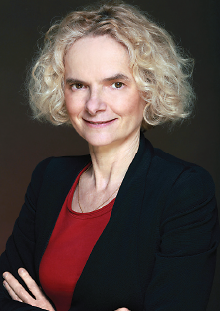Journalist Elizabeth Vargas to Present Menninger Lecture at Convocation
Abstract
Following the lecture, Vargas will be interviewed by Nora D. Volkow, M.D., director of the National Institute on Drug Abuse.
An award-winning journalist and television anchor who has experienced mental illness and substance use disorder and a world-renowned addiction scientist—also with a family history of tragedy related to addiction—will come together for an interview at this year’s Convocation of Distinguished Fellows.

Award-winning television journalist Elizabeth Vargas is the author of a memoir that describes her experience with anxiety and alcoholism.
But the tables will be turned for this event: Nora D. Volkow, M.D., the director of the National Institute on Drug Abuse (NIDA), will interview journalist Elizabeth Vargas after Vargas delivers the 2017 William C. Menninger Lecture.
Vargas, the co-anchor of ABC’s “20/20” with David Muir, was credited by The New York Times for reinvigorating the newsmagazine format with her “intellectually brave” reporting. She has traveled the world covering breaking news stories, reporting on in-depth investigations, and conducting interviews with high-profile newsmakers.
In September 2016, Vargas published the memoir Between Breaths: A Memoir of Panic and Addiction. The book details her struggles with anxiety and alcohol abuse and tells a powerful story of recovery and coping.
Volkow became director of NIDA in May 2003. Her work has been instrumental in demonstrating that drug addiction is a disease of the human brain, and she pioneered the use of brain imaging to investigate the toxic effects and addictive properties of abusable drugs. Her studies have documented changes in the dopamine system affecting, among others, the functions of frontal brain regions involved with motivation, drive, and pleasure in addiction. Volkow has published more than 600 peer-reviewed articles and written more than 95 book chapters and other manuscripts.

Nora D. Volkow, M.D., has pioneered research on the motivational system that compels addicts to repeat their destructive addictive behavior.
The interview between Volkow and Vargas promises to be a highlight of this year’s meeting. At last year’s Annual Meeting in Toronto, Volkow described her own experience of learning—late in life—that her maternal grandfather had died by suicide as a result of alcoholism, a secret that Volkow’s mother kept for years out of shame.
In relating the story, Volkow linked it to the important addiction research in recent years implicating dopamine in the motivational system of the brain that causes addicts to continually use and re-use their drug of addiction despite its devastating consequences.
People who are addicted to drugs or alcohol use them again and again, Volkow explained, because they have been conditioned to the place where they take drugs, to the dealer who sells the drugs to them, to the friends with whom they get high, and to the emotional states that precede using the drugs. Moreover, dopamine pathways are fundamental in the prefrontal areas of the brain regulating self-control, working memory, decision making, and judgment, Volkow explained.
It is this disruption of myriad circuits regulating the human capacity to plan and make judgments based on changing circumstances that causes the addict to behave in such a puzzling fashion. And that, in turn, is what accounts for the shame that surrounds the condition.
Volkow told psychiatrists at last year’s meeting, “I realized that my mother’s shame was not just because my grandfather had been alcoholic, but because he had committed suicide out of hopelessness and helplessness at his inability to control the strong urge to drink, to relapse again and again and again until that one last moment of self-hatred when he killed himself.
“This is my story and I live with it,” she said. “I wanted to share it with you so that this does not happen to our patients. If we embrace the concept of addiction as a chronic disease where drugs have disrupted the most fundamental circuits that enable us to make a decision and follow it through, we will be able to decrease the stigma not just in the lay public, but among providers and insurers so that people with mental illness do not have to go through obstacles to obtain the evidence-based treatments, so that they don’t feel that shame.” ■
The Convocation of Distinguished Fellows will be held Monday, May 22, at 5:30 p.m. in Hall F, Ground Level, San Diego Convention Center.



